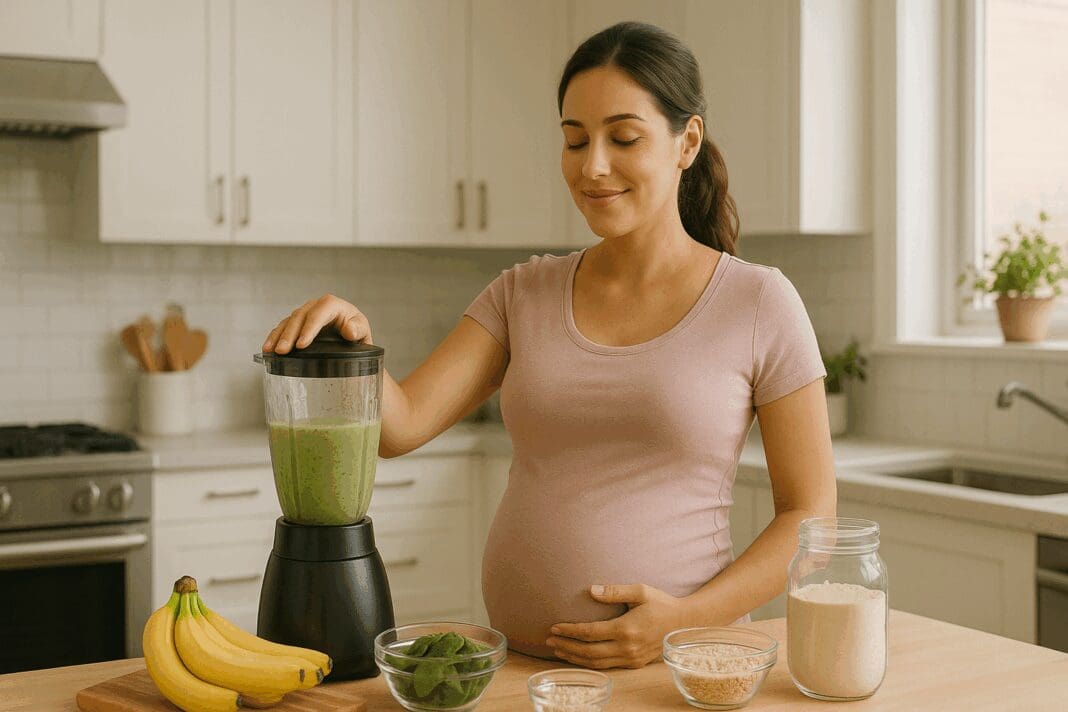Pregnancy is a transformative journey that brings about profound physiological changes, increased nutritional needs, and a renewed focus on maternal and fetal health. One of the most frequently discussed aspects of prenatal nutrition is protein intake. Protein is vital for fetal growth, maternal tissue expansion, and hormonal balance. As dietary routines evolve during pregnancy to meet these increased demands, many women find themselves exploring new, convenient sources of nutrition. Among these, protein shakes have emerged as a practical and often necessary option. However, the growing popularity of protein shakes while pregnant has also raised important questions about safety, effectiveness, and ingredient quality. This comprehensive guide provides evidence-based insights, expert advice, and practical strategies to help expectant mothers navigate the landscape of protein supplementation during pregnancy.
You may also like: 7 Vital Reasons to Choose Yogurt for Pregnant Women’s Diet
Understanding Protein Requirements During Pregnancy
The demand for protein significantly increases throughout the stages of pregnancy. During the first trimester, the recommended dietary allowance (RDA) for protein remains relatively stable, but by the second and third trimesters, a pregnant woman requires approximately 1.1 grams of protein per kilogram of body weight daily. This increase supports the development of the baby’s organs, brain, muscles, and connective tissues, as well as the growth of the placenta and expansion of maternal tissues.
Protein plays a central role in the formation of enzymes and hormones that regulate pregnancy. It also supports immune function, which is especially important as pregnancy slightly suppresses the maternal immune system. Given the challenge of meeting elevated protein needs through whole foods alone, particularly in the context of nausea, food aversions, or dietary restrictions, protein shakes during pregnancy can serve as an effective nutritional bridge.
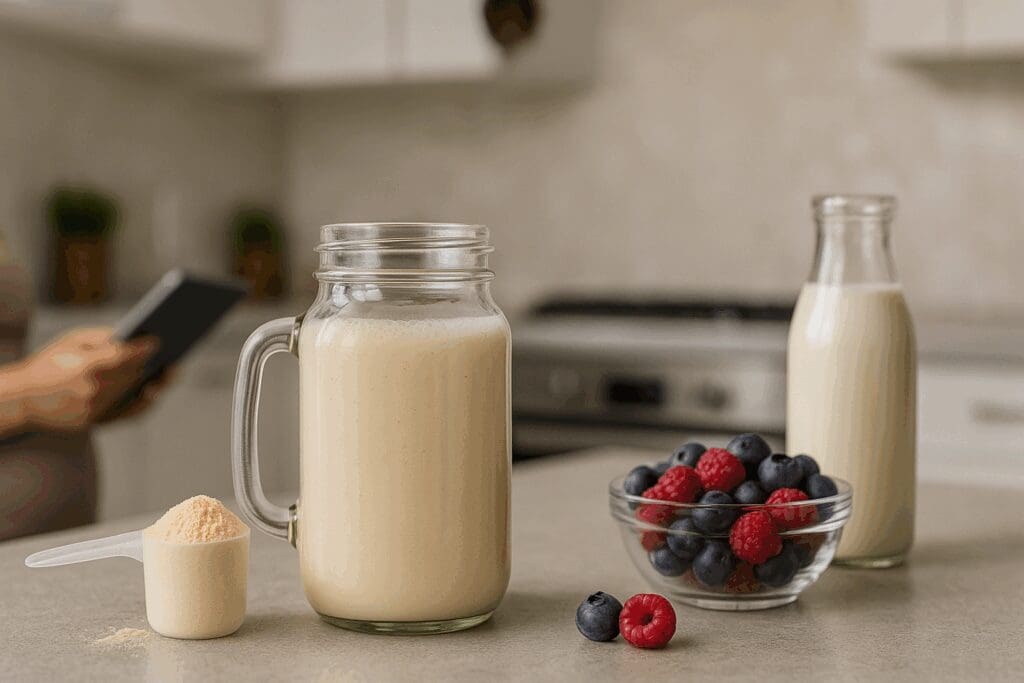
Safe and Strategic Use of Protein Shakes While Pregnant
When used thoughtfully, protein shakes while pregnant can be a safe and strategic way to support maternal and fetal health. The key lies in selecting high-quality protein powders, ensuring proper dosage, and avoiding additives that may be harmful during pregnancy. Pregnant women should consult with their healthcare provider or a registered dietitian before introducing any new supplement into their diet.
Many protein powders are formulated with athletes in mind, which means they may contain stimulants, artificial sweeteners, or other compounds not recommended for pregnancy. Expectant mothers should choose options labeled as pregnancy safe protein powder or those specifically designed as maternity protein shakes. These formulations typically exclude ingredients like caffeine, excess vitamin A, and herbal blends that lack safety data in pregnancy.
Another important consideration is balance. Protein shakes should not replace whole meals but rather supplement a well-rounded diet. A shake can be an ideal snack or a post-workout recovery option for active pregnant women. It can also serve as a practical morning solution when morning sickness makes solid foods unappealing. When used in moderation and as part of a broader nutritional strategy, protein shakes can offer both safety and efficacy.
Can You Drink Protein Shakes While Pregnant?
A common question many women have is: can you drink protein shakes while pregnant? The answer is yes—with caveats. Drinking protein shakes during pregnancy is generally considered safe when the shakes are made with high-quality ingredients and consumed in appropriate quantities. The source of protein, the presence of any additives, and the overall nutritional profile of the shake should all be carefully evaluated.
Most healthcare providers agree that protein powder during pregnancy is safe when sourced from reputable manufacturers who conduct third-party testing and comply with quality standards. It is important to avoid powders with high levels of heavy metals, such as lead or arsenic, which have occasionally been found in unregulated supplements. Reading labels carefully, looking for certifications, and seeking brands with transparent sourcing practices can mitigate these risks.
Some women may benefit more than others from protein supplementation. For example, vegetarians, vegans, and women with hyperemesis gravidarum or other conditions that limit food intake may find protein shakes an indispensable part of their prenatal nutrition plan. As always, the decision to use a specific supplement should be guided by individualized healthcare advice.
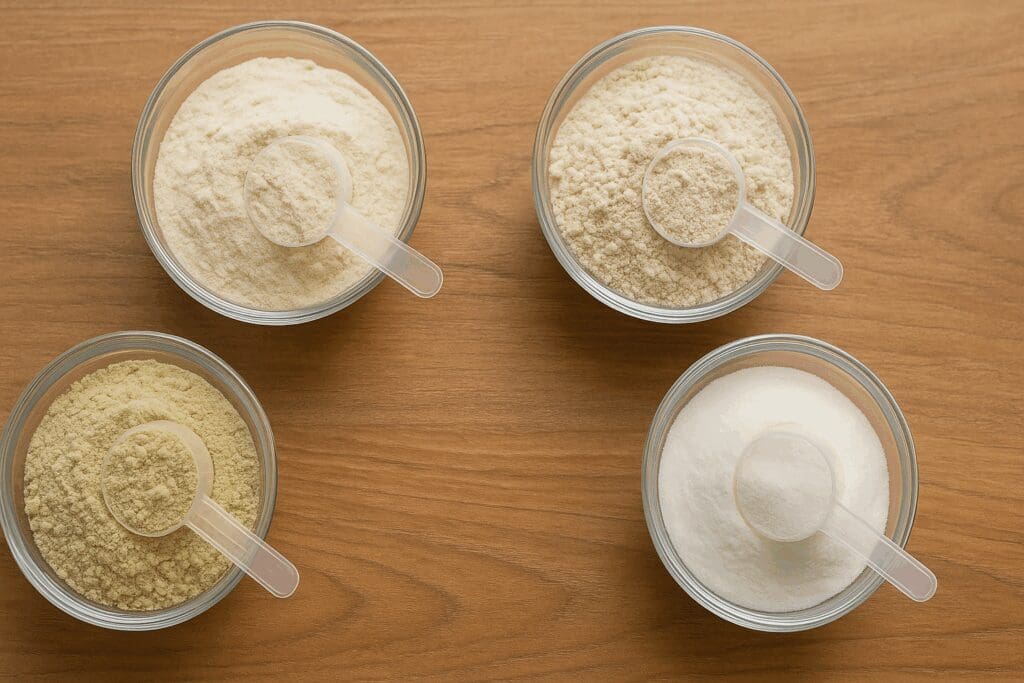
Exploring the Best Protein Powder for Pregnancy
Choosing the best protein powder for pregnancy involves more than selecting the product with the highest protein content. Quality, digestibility, ingredient transparency, and the presence of beneficial micronutrients all play a role. One of the most popular and extensively studied types of protein is whey protein. Whey protein for pregnant women offers several advantages, including a complete amino acid profile, high bioavailability, and ease of digestion.
Whey protein during pregnancy can help support tissue growth and repair, especially as the body adapts to the physical demands of gestation. However, women with lactose intolerance or sensitivities may prefer plant-based alternatives such as pea protein, rice protein, or a blend of multiple plant proteins. These options can be just as effective when consumed in appropriate amounts and balanced with other dietary sources.
Pregnancy-safe protein powder should ideally be free from added sugars, artificial colors, preservatives, and unverified herbal extracts. Some products also include added folic acid, iron, or calcium, which can be beneficial, but it is crucial to ensure that total nutrient intake from all sources does not exceed recommended upper limits. Personalized guidance from a prenatal nutrition specialist can help ensure that supplementation aligns with the mother’s specific needs and health status.
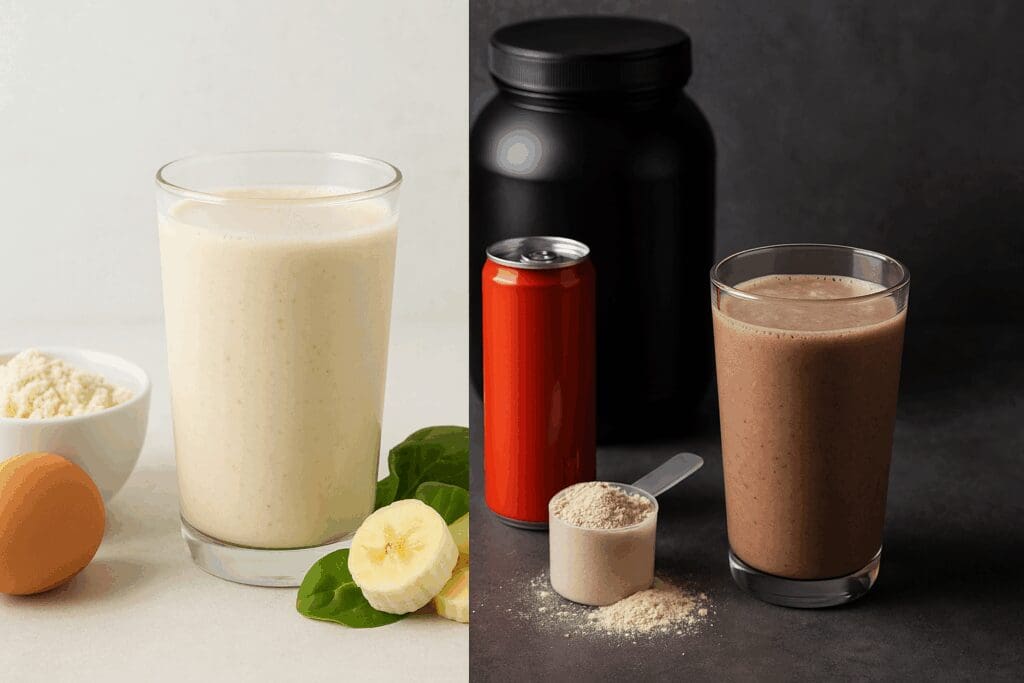
How to Identify Protein Shakes Safe During Pregnancy
Protein shakes safe during pregnancy share several key characteristics that distinguish them from general-purpose or performance-focused products. First and foremost, they are manufactured under stringent safety standards and preferably tested by third-party laboratories for contaminants. Certifications such as NSF Certified for Sport or USP Verified can provide additional assurance of quality.
These protein shakes typically use protein sources that are easy to digest and unlikely to provoke allergic reactions. Common safe options include whey isolate, hydrolyzed collagen, or organic plant-based proteins. The ideal shake will also have a clean label, meaning it contains a short list of easily recognizable ingredients without unnecessary fillers or synthetic additives.
In addition to the protein source, other components of the shake deserve attention. A good pregnancy shake should provide modest amounts of carbohydrates and healthy fats to promote satiety and support balanced blood sugar levels. Ingredients such as chia seeds, flaxseeds, oats, and nut butters can enrich the shake’s nutrient profile. Including natural flavorings like vanilla or cocoa powder, as well as fruits like berries or bananas, can also improve palatability without compromising safety.
Whey Protein and Pregnancy: A Nutritional Partnership
Whey protein and pregnancy form a nutritionally beneficial partnership when used appropriately. Whey is a complete protein, meaning it contains all nine essential amino acids that the body cannot synthesize on its own. These amino acids are particularly important during pregnancy, as they contribute to fetal brain development, muscle growth, and immune system formation.
One of the strengths of whey protein for pregnant women is its rapid absorption, which makes it an excellent choice for replenishment after physical activity. For expectant mothers who are continuing to engage in moderate exercise, such as prenatal yoga or swimming, a whey-based protein shake can help support muscle repair and maintain energy levels. However, care must be taken to ensure that the total protein intake remains within recommended limits to avoid placing undue strain on the kidneys.
Whey protein while pregnant should be consumed in conjunction with whole foods to ensure a balanced intake of vitamins, minerals, and fiber. Some products also contain added digestive enzymes, which may aid in nutrient absorption and minimize bloating. Ultimately, choosing a high-quality whey product with minimal processing and no artificial ingredients can enhance the safety and nutritional value of protein shakes.
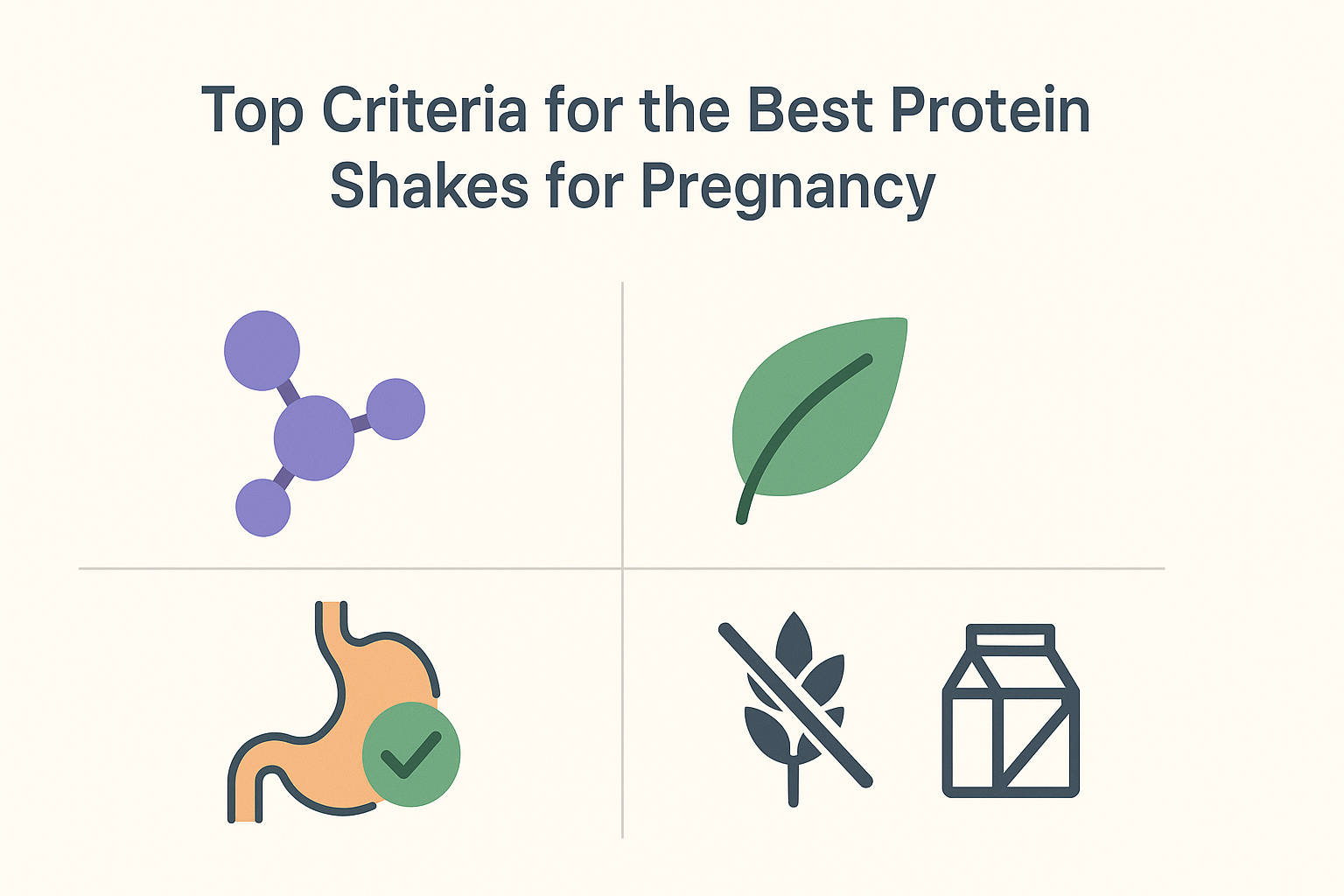
Top Criteria for the Best Protein Shakes for Pregnancy
Evaluating the best protein shakes for pregnancy involves several layers of scrutiny. First, the protein content should be appropriate for the woman’s daily needs—typically between 15 and 30 grams per serving, depending on individual dietary gaps. Second, the shake should contain a balance of macronutrients and offer a source of dietary fiber, either from added ingredients or as part of the protein base.
Flavor and texture are also important, as adherence to supplementation often hinges on palatability. Natural sweeteners such as stevia or monk fruit are generally preferred over artificial alternatives. Moreover, the shake should mix easily with liquids and maintain a smooth consistency when blended with fruits or other add-ins. These practical factors can influence how consistently the shake is consumed.
The best protein shakes for pregnancy are often those that adapt to various dietary preferences and sensitivities. Brands offering allergen-free, gluten-free, non-GMO, and organic options may be better suited for health-conscious expectant mothers. Reading reviews, consulting with healthcare professionals, and even sampling small trial sizes before committing to a full-size product can be worthwhile strategies.
Can You Drink Protein Powder While Pregnant? Expert Insights
The question of whether you can drink protein powder while pregnant is not only common but crucial to understanding prenatal nutrition in today’s supplement-rich environment. The answer depends largely on the specific product and the overall dietary pattern of the individual. Most experts agree that protein powder for pregnancy can be a helpful addition when chosen and used wisely.
High-quality protein powders derived from clean, recognizable sources can serve as convenient tools to help bridge nutritional gaps. However, indiscriminate use of protein supplements without medical supervision can lead to nutrient imbalances or expose the mother and baby to potentially harmful ingredients. For example, some mass-market protein powders may contain high levels of vitamin A from retinol, which can be teratogenic in large amounts.
Medical practitioners often emphasize that protein powders should never replace whole foods but rather supplement an already nutritious diet. Whole food sources provide essential co-factors, fiber, and enzymes that support digestion and nutrient utilization. Protein powder while pregnant should be viewed as a supplement in the truest sense of the word—to supplement, not to supplant.
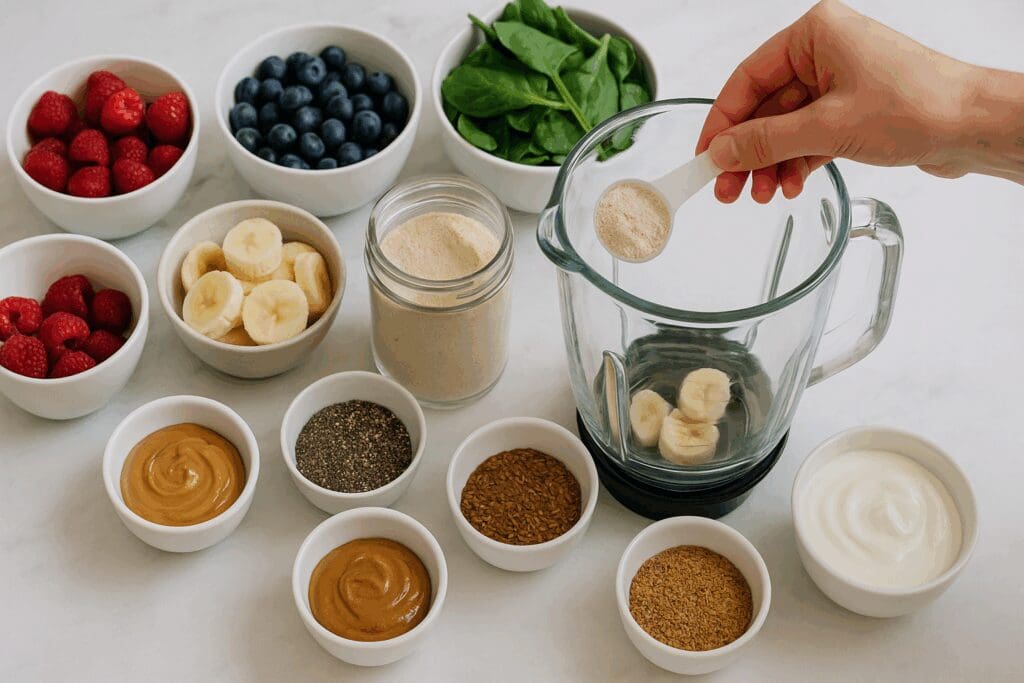
Customizing Protein Shakes for Pregnancy Wellness
Tailoring protein shakes to meet individual needs is one of the most empowering aspects of using them during pregnancy. Rather than relying solely on prepackaged blends, expectant mothers can create customized shakes using pregnancy-safe protein powder and whole food ingredients. This approach allows for greater control over nutrient density, flavor, and caloric content.
For instance, a morning shake might include protein powder, Greek yogurt, banana, spinach, and flaxseed for a nutrient-packed start to the day. An afternoon pick-me-up might blend almond milk, berries, a scoop of maternity protein powder, and a teaspoon of almond butter. These combinations not only enhance variety and taste but also ensure that the shake provides a full spectrum of macro and micronutrients.
Customizing shakes can also help address specific pregnancy concerns such as constipation, low energy, or blood sugar imbalances. Including fiber-rich ingredients like oats or psyllium husk can support digestion, while adding sources of healthy fat like avocado can promote sustained energy. With guidance from a registered dietitian, these shakes can be fine-tuned to align with trimester-specific needs and individual health goals.
Protein Shakes During Pregnancy: Real-World Applications
Incorporating protein shakes during pregnancy into daily life requires thoughtful planning and a bit of experimentation. Many women find that a morning shake helps them maintain energy and reduce nausea, especially during the first trimester. Others prefer to use shakes post-workout or between meals to curb hunger and stabilize blood sugar levels.
Timing and context matter. For example, consuming a protein shake with a piece of whole grain toast or a serving of fruit can provide a more balanced macronutrient profile than drinking the shake alone. Integrating shakes into a daily routine may also make it easier to avoid nutrient gaps during busy days or when appetite fluctuates.
In addition to being a convenient source of nutrition, protein shakes can also serve as a creative culinary outlet. Experimenting with different combinations of fruits, spices, and bases allows for variety and prevents taste fatigue. Adding ingredients like cinnamon, ginger, or turmeric not only enhances flavor but also provides potential anti-inflammatory benefits—though it’s important to verify the safety of any new additions with a healthcare provider.
A Closer Look at Maternity Protein Shakes: Myths and Facts
Despite their benefits, maternity protein shakes are often surrounded by myths and misinformation. Some individuals believe that these shakes can cause excessive weight gain or lead to a reliance on supplements. However, when integrated into a balanced diet and consumed in appropriate portions, protein shakes contribute to satiety and support healthy weight management during pregnancy.
Another myth is that all protein powders are created equal. In reality, the quality, source, and formulation vary significantly between brands. Choosing a good protein powder for pregnancy requires careful examination of the ingredient list, sourcing practices, and third-party testing protocols. Transparency from manufacturers is essential to making informed decisions.
Concerns about allergens and gastrointestinal side effects are also common. While some women may experience bloating or discomfort with certain types of protein, such as whey concentrate, alternatives like whey isolate or plant-based proteins may be better tolerated. Listening to one’s body, tracking symptoms, and consulting healthcare professionals can help address these concerns effectively.
Empowering Pregnancy Nutrition with Protein Shakes
Ultimately, protein shakes represent one of many tools available to support a healthy pregnancy. They offer a convenient, adaptable, and often enjoyable way to meet increased protein needs while respecting individual preferences and dietary limitations. Their utility is especially pronounced for women managing nausea, food aversions, or restricted diets.
However, as with any supplement, education and customization are key. Expectant mothers are encouraged to view protein shakes not as a one-size-fits-all solution but as part of a dynamic nutritional strategy tailored to their specific needs. By combining evidence-based guidance with a personalized approach, protein shakes can become a safe, effective, and empowering part of the maternal wellness journey.
Frequently Asked Questions About Protein Shakes While Pregnant
Can pregnant women drink protein shakes made with non-traditional ingredients like mushrooms or algae?
Yes, pregnant women can consume protein shakes that include non-traditional protein sources such as mushrooms or algae, but these ingredients require careful vetting. Algae-based proteins like spirulina or chlorella offer high nutrient density, including iron and B vitamins, but they also pose risks if harvested from contaminated waters due to heavy metal accumulation. Medicinal mushrooms such as reishi or cordyceps may have immune-modulating properties, but their safety during pregnancy is not yet well-established in clinical literature. For this reason, it’s critical to consult with a healthcare provider before adding such ingredients. While innovation in protein shake formulations is expanding, the use of less conventional components must be guided by current scientific evidence and personalized health considerations.
Are there psychological or behavioral benefits to using protein shakes while pregnant?
Interestingly, incorporating protein shakes while pregnant can offer more than just physiological benefits—it can support emotional and behavioral well-being as well. Establishing a structured routine around nutrition, such as starting the day with a nutrient-dense shake, may reduce anxiety associated with meal planning or food aversions. Some women report that the simplicity of a protein shake provides a sense of control and predictability during a time of significant physical and emotional change. Additionally, consistent protein intake may stabilize blood sugar, which in turn helps regulate mood swings and reduces fatigue. These indirect mental health benefits make protein shakes an appealing and accessible wellness tool during pregnancy.
What emerging trends are shaping the future of maternity protein shakes?
One of the most exciting developments in maternity protein shakes is the inclusion of functional ingredients tailored for prenatal needs. Brands are beginning to integrate nutrients like choline for fetal brain development, adaptogens to support stress resilience, and bioavailable iron to counter anemia. There is also a growing shift toward personalized nutrition platforms, where expectant mothers receive customized protein powder blends based on blood biomarkers and DNA profiles. Innovations in sustainable protein sourcing—such as insect protein and fermented plant proteins—are also gaining traction, though these remain niche and warrant further safety studies in the context of pregnancy. These trends point to a future where protein powder for pregnancy evolves into a holistic, science-driven supplement category.
How can pregnant women evaluate if their current protein intake is adequate without over-relying on supplements?
Pregnant women can assess their protein needs through a combination of clinical and observational strategies. One of the most effective tools is a dietary journal reviewed by a registered dietitian, which helps identify gaps or excesses in protein intake. Simple biomarkers like serum albumin and prealbumin levels can also reflect protein status, although these are more commonly used in clinical settings. Physical signs such as slow wound healing, persistent fatigue, or unexplained muscle loss may indicate inadequate protein. However, it is equally important to avoid overconsumption, as excessive protein powder while pregnant can strain the kidneys and displace other vital nutrients. Finding a balance through whole foods first and using shakes as supportive additions is key.
Is whey protein while pregnant safe for women with a family history of dairy allergies?
Whey protein while pregnant may not be suitable for women with a family history of dairy allergies, especially if there is a genetic predisposition to casein or lactose intolerance. While some forms of whey, such as whey isolate, are low in lactose, they still contain milk proteins that can trigger allergic responses. For these individuals, hypoallergenic alternatives such as hydrolyzed rice protein or certified allergen-free plant-based blends are often safer choices. Genetic factors should not be dismissed, especially when considering potential sensitization of the fetus. Women with familial dairy sensitivities should consider allergy testing and seek professional guidance before incorporating whey protein for pregnant women into their routine.
Can you drink protein powder while pregnant if you are on a restrictive diet, such as gluten-free or keto?
Yes, you can drink protein powder while pregnant even if you follow a restrictive diet, but the formulation of the shake becomes especially important. For those adhering to a gluten-free lifestyle, it’s essential to choose a certified gluten-free protein powder for pregnancy to avoid cross-contamination, which can trigger autoimmune responses in individuals with celiac disease. Pregnant women on a ketogenic diet must also be cautious, as high-fat, low-carb shakes may lack necessary fiber, micronutrients, or safe pregnancy-related components. In such cases, a pregnancy safe protein powder should also include additional vitamins and minerals that are commonly missing in restrictive diets. Working with a prenatal nutritionist helps ensure that any shake supports both maternal health and fetal development without violating dietary boundaries.
How do protein shakes during pregnancy interact with common prenatal supplements like folic acid or iron?
Protein shakes during pregnancy can complement or interfere with prenatal supplements, depending on timing and ingredient composition. For example, shakes fortified with calcium may reduce iron absorption if consumed simultaneously, so spacing them apart by a few hours is advisable. Some maternity protein shakes now include bioavailable forms of iron and folic acid to streamline supplementation, but this necessitates adjusting doses to prevent excess intake. Furthermore, certain amino acids in protein shakes, such as lysine, may enhance calcium utilization and collagen synthesis, offering synergistic benefits with prenatal vitamins. To optimize these interactions, women should create a coordinated supplementation schedule tailored to their lab results and health status under medical supervision.
What’s the long-term benefit of using good protein powder for pregnancy beyond birth?
Using good protein powder for pregnancy may have positive implications for postpartum recovery and even lactation outcomes. High-quality protein during the prenatal period helps build maternal reserves that can be drawn upon during the demanding fourth trimester. Postpartum healing, including uterine involution, muscle repair from delivery, and recovery from potential surgical incisions, all require adequate protein. Additionally, protein intake influences the quality and volume of breast milk, particularly the amino acid profile, which supports infant growth. Some studies suggest that women who maintain a consistent intake of protein powder during pregnancy may transition more smoothly into breastfeeding, thanks to preserved nutrient stores and metabolic resilience.
Why are protein shakes for pregnancy increasingly being recommended by midwives and doulas?
Midwives and doulas are increasingly recommending protein shakes for pregnancy due to their ability to address common yet under-discussed nutritional challenges. For instance, many women struggle with consistent meal timing due to nausea, fatigue, or appetite changes, and shakes offer a manageable solution. These professionals also recognize that the best protein shakes for pregnancy help stabilize blood sugar levels, reducing the risk of gestational diabetes. Moreover, shakes can be a strategic tool during the late third trimester when stomach capacity shrinks and solid meals become harder to digest. By providing both convenience and targeted nourishment, protein shakes align with the holistic, body-aware philosophies often embraced by midwifery care models.
How do social and cultural factors affect perceptions of protein shakes when pregnant?
Social and cultural perceptions significantly influence how women view the use of protein shakes when pregnant. In some communities, there’s a stigma around supplementation during pregnancy, rooted in traditional beliefs that all nutrition should come from whole foods. In contrast, other cultures highly value modern nutritional science and see protein shakes as a sign of proactive prenatal care. Media representations also play a role; influencers and prenatal wellness brands have contributed to the normalization of maternity protein shakes, which can shape expectations and behaviors. These perceptions impact whether women feel supported or judged in their nutritional choices, highlighting the importance of culturally sensitive healthcare advice that validates individual preferences while ensuring safety and efficacy.
Concluding Reflections on Protein Shakes While Pregnant: A Balanced, Evidence-Based Approach
The exploration of protein shakes while pregnant reveals a nuanced landscape that balances safety, efficacy, and individualization. Far from being a trend-driven shortcut, protein supplementation can play a critical role in supporting maternal and fetal health when executed thoughtfully and with medical oversight. Whether through whey protein, plant-based blends, or custom-made smoothies, the inclusion of protein shakes can help address nutritional challenges in a practical and enjoyable way.
Pregnancy is a time of heightened awareness and intentionality. Every nutritional choice carries weight, not only for the physical well-being of the mother but also for the developmental trajectory of the baby. Protein shakes, when selected with care and integrated into a comprehensive dietary plan, offer more than just convenience—they offer a means of nurturing life at its most foundational level. For expectant mothers seeking to optimize their health and support their growing baby, protein shakes represent a flexible and evidence-backed option worth considering. By prioritizing quality, consulting healthcare professionals, and staying attuned to the body’s signals, pregnant women can harness the full potential of protein shakes as part of a vibrant and healthy pregnancy journey.
Further Reading:
What to look out for when choosing a pregnancy-safe protein powder
Is it safe to drink protein shakes while pregnant?
The Best Pregnancy-Safe Protein Powders, According to Dietitians

